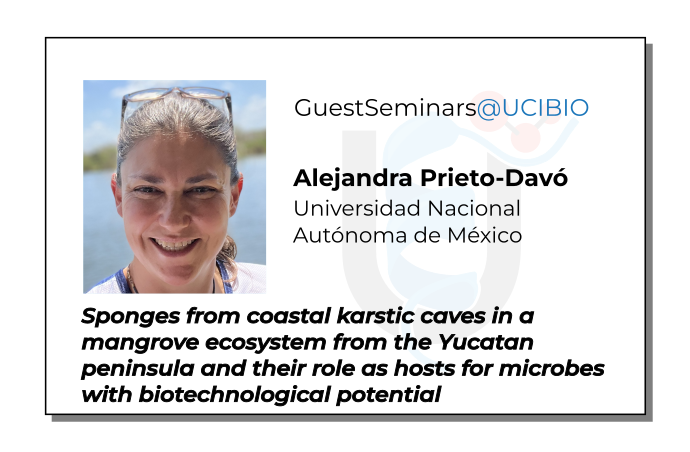
Sponges from coastal karstic caves in a mangrove ecosystem from the Yucatan peninsula and their role as hosts for microbes with biotechnological potential
Alejandra Prieto-Davó, Faculty of Chemistry, National Autonomous University of Mexico
Host: Susana Gaudêncio, UCIBIO NOVA
Online Link: https://ucibio.pt/l/GuestSeminars
Abstract:
The Yucatan peninsula is characterized by the karstic composition of its soils and the resulting underground caves and conduits which encompass the largest underground river in the world. In these caves, our lab has recently discovered sponges with microbiomes showing important roles in biogeochemical cycles, including sulfur, nitrogen and methane. Metagenomes from these sponges show presence of genes involved in the biosynthesis of terpenes and ribosomally synthesized and post translationally modified peptides (RiPPs). Culturable Psychrobacter bacteria from one of these sponeges have shown presence of polyketide synthase genes suggesting they have the potential to produce molecules with biological activity. The presence of genes for the syntesis of important secondary metabolite pathways suggests that these sponges are important sources of microbes with biotechnological potential. Additionally, further exploration of organic bacterial extracts should confirm antibiotic activities against pathogenic bacteria.
Short-bio:
Dr. Alejandra Prieto-Davó is a Full-Time Professor at the Faculty of Chemistry of the National Autonomous University of Mexico (UNAM), Sisal Unit, Yucatán. She holds a B.Sc. and M.Sc. in Oceanography from the Universidad Autónoma de Baja California and a Ph.D. in Oceanography from the Scripps Institution of Oceanography, where she also completed postdoctoral research in Marine Microbial Ecology at Scripps and San Diego State University.
Dr. Prieto-Davó’s research focuses on the microbial ecology and biotechnology of marine and coastal microorganisms, emphasizing the genomic and metagenomic exploration of microbial communities for the discovery of novel natural products and the elucidation of their ecological functions. Her laboratory investigates microbial diversity, biosynthetic pathways, and their roles in marine ecosystems, combining molecular, genomic, and cultivation-based approaches.
She is a member of Mexico’s National System of Researchers (SNI, Level I → II in 2026) and participates in international initiatives such as the UNESCO Global Ocean Observing System (GOOS) BioEco Panel and the Ocean Biomolecular Observing Network (OBON) Scientific Advisory Committee. Dr. Prieto-Davó has led and collaborated on numerous national and international research projects, supervised graduate and undergraduate theses, and authored over thirty peer-reviewed publications on microbial diversity, metagenomics, and marine natural products.
